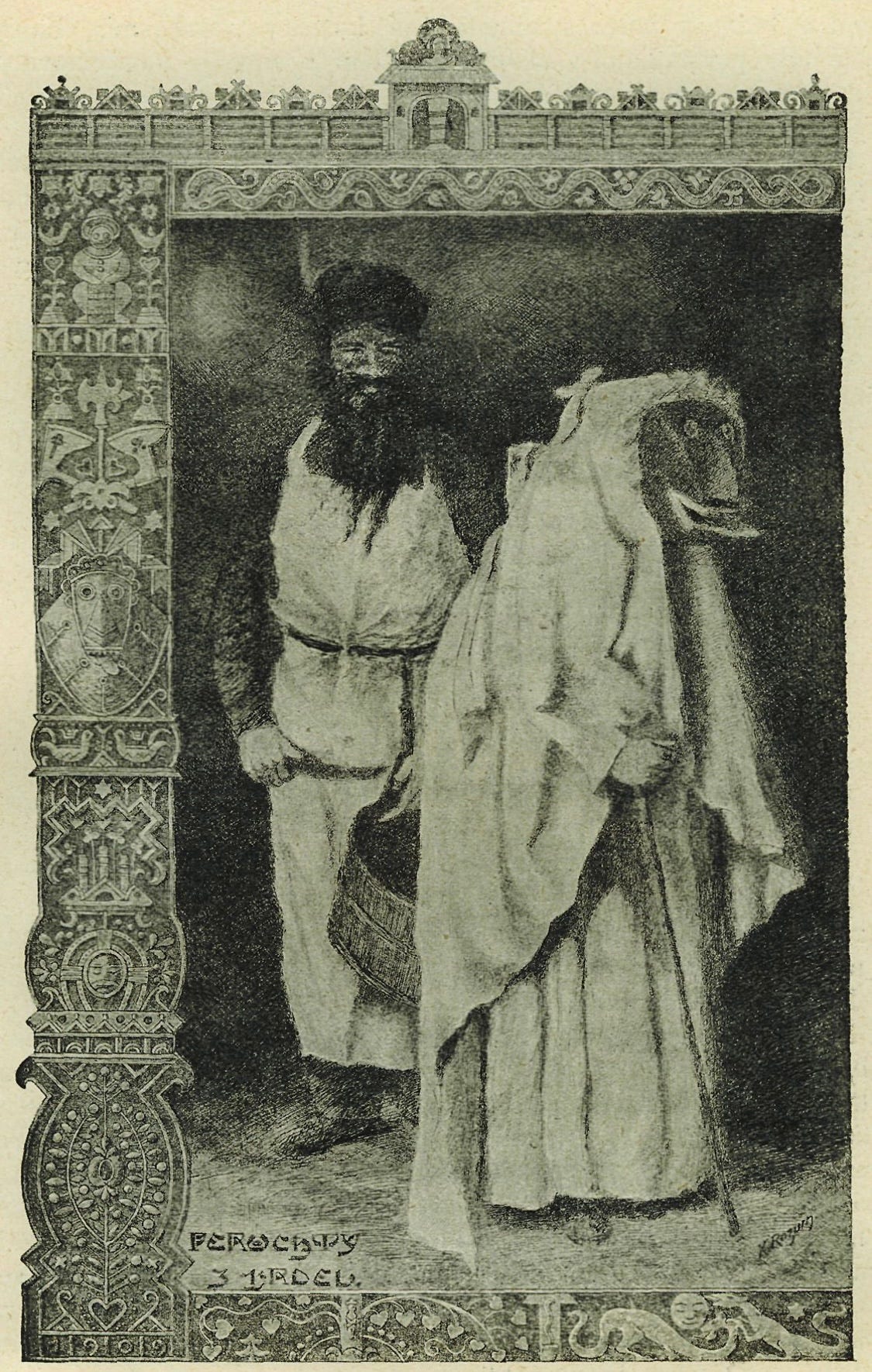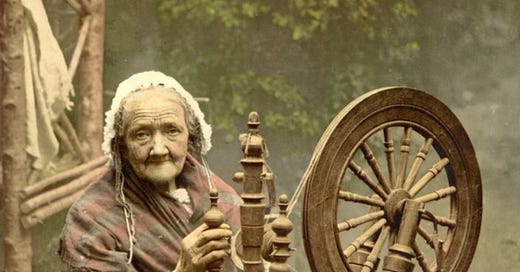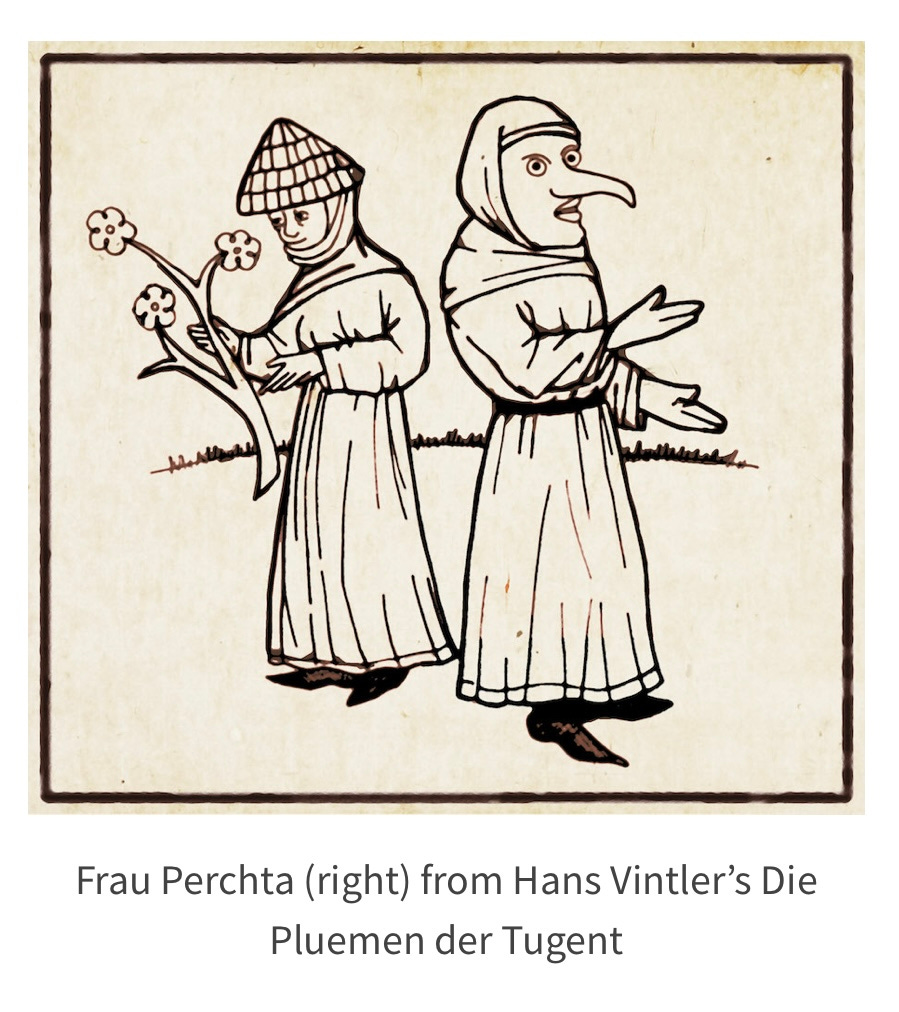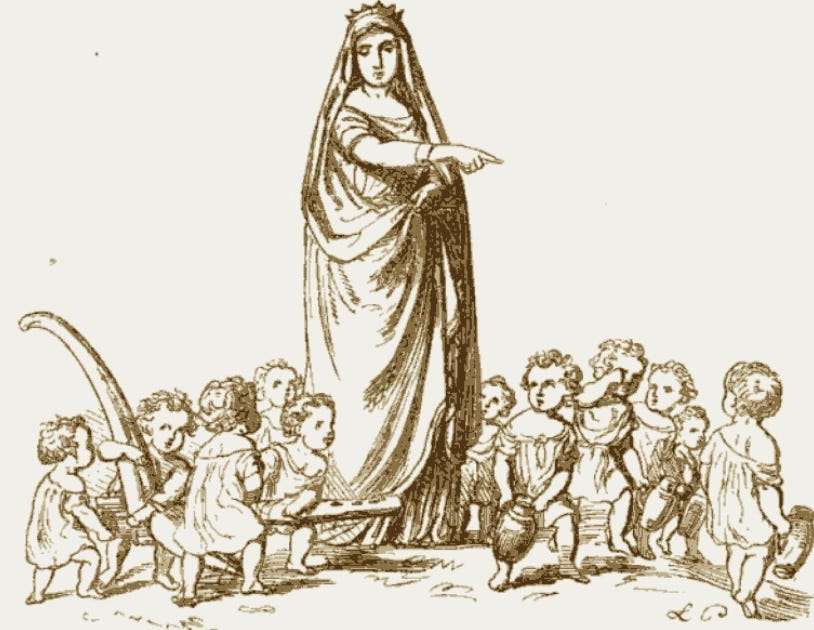Hello, friends. Welcome to the third Folklore Friday and the last of this little mini series. If you’d like, you can read part 1 and part 2. I hope you all enjoy today’s post. Please leave a comment if you do!
P.S. I’m sending a brief poll for paid subscribers today, too.
The Crone is one we often shy away from. Far removed from society’s youth-obsessed beauty standards, she reminds us of things we’d rather forget: mortality. the inevitable passage of time. Even death.
This might be the most uncomfortable of all her associations. Certainly as a culture that worships youth, and for me as an individual.
As someone who grew up in religion focused on heaven and hell, death was a lot more in the forefront for me than it seemed to be for a lot of kids. Even now, sometimes I have a hard time escaping the grips of sheer terror of dying. Maybe it’s the outcome of trauma; I used to have a much harder time being present than I do now, and sorting through my past has led to a lot of grief around things I didn’t get to experience as a teenager and young adult because of the abject fear of failing that white evangelicalism instilled in me. Sometimes it feels like my death is only a breath away; I fear my life will be over before it’s even started. Trauma is so fun.
When I can take some deep breaths and ground myself in the present, I can say: now is good. Now is enough. And I can look at how age and the crone offers gifts we as a culture tend to ignore and shun.
Society would love to keep all old women, or any woman past 401, confined to a nice, harmless grandma image. Yet it’s the women aged 40-60 no one knows what to do with. They’re too young to be grandmas, no longer bearing children, and usually have no you-know-what's to give, thus failing to fall neatly into either the young, sexually attractive woman or the harmless, comforting old lady category.2
Personally, I can’t wait for that period! Defy the socially constructed boxes! Only two more years to go…but, like many of you, I’m determined not to wait.
There’s a reason the snarky, take-no-bullshit old woman stereotype exists. For many women, the loss of the very thing that made us valuable and a threat to society (namely, our youthful, sexual attractiveness and prescribed value) means experiencing a level of freedom from the expectation to perform. Of course, there’s a lot that’s problematic about that. We ascribe sexuality to youth alone, as if it just automatically disappears with age. It’s sad that, for so many of us, it takes until our later years to break free from these expectations at all. Though I think in recent years, there seems to be a movement of women striving to break cycles much earlier than our crone years.
There are a many folklore figures who defy the sweet, harmless old lady narrative, and I love them for it. In Germanic folklore, Perchta (or Berchta) is associated with winter and is seen in one of two aspects. Sometimes appearing as young and beautiful, it’s her ferocious, beaked hag form that intrigues me. She is often responsible for leading the Wild Hunt in winter. She watches over the spinning and metes out dire consequences to women who fail to finish this task in time, such as making an irreversible tangle of the threads left on the spinning wheel.3 It is said that her flat or goose foot demonstrates her commitment to spinning and her ability to shape-shift: she may have mostly human features, but there is nothing tame about her.
While her violence extends to slitting the bellies of lazy, disobedient children and replacing their innards with straw and stones, she is alternately known as a protector of women, children, and babies. Perchta is seen leading the souls of deceased children and babies safely to the afterlife, and, alongside Krampus, will steal naughty children away for dubious and dangerous ends. Why these apparent contradictions?

I don’t have any solid answers, but then, folklore inspires nothing if not questions. I wonder if Perchta‘s seeming opposites point to her defiance of fitting into a single, tidy narrative. Countless folktales serve as warnings; maybe, even in her harsh judgment towards slovenly housework, she’s reminding women that they need to take a break from the work that is never done. Maybe in both her dangerous and gentle aspects towards children, she’s reminding us of the dangers of the harsh world we live in, even as we strive for a gentler one for the following generations.
You know the practice of speaking to your inner child? I started a practice of speaking to my inner old lady. I imagine myself, should I be fortunate to live long enough, as a frail, grey-haired woman laced with a network of wrinkles, my soft, sagging body wearing something comfy and colorful. The spark of mischief in my eye isn’t just a devil-may-care attitude afforded those who have lived three or more generations’ worth. It’s a spark of someone who still sees beauty in the world and in people. The spark of someone who calls bs on injustice and bigotry. The spark of someone who still laughs at the world and herself, for different and not-so-different reasons. I think of growing into the age when people become invisible to the world, and I think of all the kind words stored up for me when I get there. It makes me feel a bit less afraid, knowing I’m already looking out for myself.
Who knows. I might join some kind of wild hunt. I think I’ll forgo snooping in other people’s houses, though.
What comes to mind when you think of old age? Are you familiar with any folklore figures who defy age expectations? Do you have a favorite?
This is one modern critique of the MMC: that in this framework, once a woman is past childbearing age, she’s immediately labeled old. That once again, her life is measured solely by her reproductive cycle. While ancient beliefs regarding age offered more reverence to elders, today we don’t face the same need to reproduce as ancient cultures whose survival may have depended on offspring.
obviously, these are generalizations, and the emphasis is usually on white women. Black women aren’t often afforded the same luxuries in aging. See this article, this one, and this one.
this article describes her as a ‘mad Martha Steward crossed with the Grinch who stole Christmas’ and I can’t stop laughing about it.








I love the idea of talking to our inner crone!
I can't wait to be in my mad crone phase.